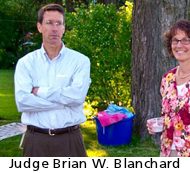7/25/2011
Wisconsin Appeals Court Makes Cautious Driving a CrimeTwo unexplained stops at an intersection is sufficient cause for a traffic stop according to Wisconsin appellate decision.

Driving with extreme care can be evidence of a crime, according to a ruling Thursday by the Wisconsin Court of Appeals. Motorist Kevin J. Burch was driving his pickup truck through West Salem at 12:44am when a police officer took notice. The officer watched as the truck slowed to a near stop at an intersection, even though there was no stop sign. At the next block, Burch again came to a full stop before proceeding. There was no other traffic nearby. The officer had taken a "drunk driving course" and found the driving suspicious -- especially since he said it was "bar time." The officer conducted a traffic stop.
The appellate court took up the question whether, up to this point, the officer's actions were consistent with the Fourth Amendment requirement that police officers only stop someone they reasonably suspect has committed or is about to commit a crime. Burch argued the stop was unjustified because his driving was not unsafe, illegal or suspicious, and the bars close at 2am in the village, not 12:44. The appellate judge dismissed the timing argument.
"The phrase used by the [lower] court was clearly intended to capture the idea that a greater percentage of the drivers on the road are impaired during the post-midnight hours than at other times of day," Judge Brian W. Blanchard wrote. "The preponderance of excess drinking occurs at night, and not all tavern patrons wait to hear the final bell before departing taverns."
Burch then cited a Court of Appeals case from 2000, Wisconsin v. Fields, in which the appellate panel found that a five to ten second stop at an intersection that had no stop sign did not provide reasonable suspicion to pull over the driver. Judge Blanchard found the present case different because the second stop provided reasonable suspicion.
"If Burch had merely slowed to a near stop inexplicably one time, or had merely stopped inexplicably one time, such conduct, even at 12:44 am, might not have been sufficient," Blanchard wrote. "However, when considered together, in light of the officer's training and experience and the late hour, Burch's two separate unexplained interruptions of normal driving conduct created the circumstances for reasonable suspicion of impaired driving."
As a result, the court denied Burch's motion to suppress evidence and affirmed his conviction for driving under the influence of alcohol. A copy of the unpublished decision is available in a 60k PDF file at the source link below.


